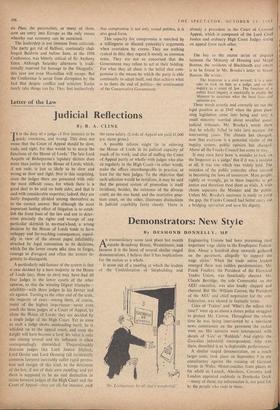Letter of the Law
Judicial Reflections
By R. A. CLINE
`TT is the duty of a judge of first instance to be lquick, courteous, and wrong. This does not mean that the Court of Appeal should be slow, rude, and right, for that would be to usurp the functions of the House of Lords.' The late Lord Asquith of Bishopstone's lapidary dictum does more than justice to the House of Lords, which, if not rude, is just as likely to be slow and wrong as slow and right. Nor is this surprising, since the judges there are presented with only the most difficult cases, for which there is a good deal to be said on both sides, and that is said with considerable expertise; indeed, they are fairly frequently divided among themselves as to the correct answer. But although the most important lasting effect of litigation is to estab- lish the front lines of the law and not to deter- mine precisely the rights and wrongs of any particular skirmish in no-man's-land, a wrong decision by the House of Lords tends to have unhappy and far-reaching consequences, especi- ally in view of the almost papal infallibility attached by legal convention to its decisions, which for the lower courts take time to forget, courage to disregard and often the utmost in- genuity to distinguish.
A particularly odd feature of the system is that a case decided by a bare majority in the House of Lords (say, three to two) may have had all four judges in the lower courts of the other opinion, so that the winning litigant triumphs- infallibly—with three judges in his favour and six against. Turning to the other end of the scale, the majority of cases—among them, of course, many of the highest importance—never even reach the three judges of a Court of Appeal, let alone the House of Lords; they are decided by a single judge of the High Court. Yet as soon as such a judge shows outstanding merit, he is whisked up to the appeal court, and soon the knight will have become a lord; his voice is only one among several and nis influence is often correspondingly diminished. Unquestionably first-rate judges like Lord Justice Diplock, Lord Devlin and Lord Denning (all incidentally common lawyers) inevitably suffer rapid promo- tion and merger of this kind, to the detriment of the Jaw, if not of their own standing; and yet there is supposed to be no real distinction in status between judges of the High Court and the Court of Appeal—they are all, for instance, paid the same salary. (Lords of Appeal are paid £1,000 p.a. more gross.) A possible reform might lie in relieving the House of Lords in its judicial capacity of much of its work, and also of staffing the Court of Appeal partly or wholly with judges who also sit regularly in the High Court—in other words, make the offices interchangeable in practice, at least for the best judges. To the objection that such selection would be invidious, it may be said that the presbnt system of promotion is itself invidious; besides, the existence of the divorce court, on the one hand, and the restrictive prac- tices court, on the other, illustrates distinctions in judicial capability fairly clearly. There is already a precedent in the Court of Criminal Appeal, which is composed of the Lord Chief Justice and ordinary High Court Judges sitting on appeal from each other.
The key to the recent series of disputes between the Ministry of Housing and Major Buxton, the residents of Blackheath and others is to be found in Mr. Brooke's letter to Major Buxton. He wrote: The Inspector is a civil servant; it is a mis- take to look on him as a judge, and on the inquiry as a court of law. The function of a public local inquiry is essentially to enable the Minister to ascertain what the local fact. and opinions are.
These words exactly and correctly set out the legal position as at 1947 when the great plan- ning legislation came into being and only a small minority worried about so-called quasi- judicial tribunals. Mr. Brooke's words show that he wholly failed to take into account the intervening years. The climate has changed; now that everyone is a potential victim of the inquiry system, public opinion has changed. Above all the Franks Council has come to stay.
It may once have been 'a mistake to look on the Inspector as a judge.' But if it was a mistake at all, it was one which was widely held. The mistakes of the public yesterday often succeed in becoming the laws of tomorrow. Most people, rightly or wrongly, go to these inquiries to get justice and therefore treat them as trials. A wide chasm separates the Minister and the public. Unless Mr. Brooke's successor is ready to jump the gap, the Franks Council had better carry out a bridging operation and save his dignity.






































 Previous page
Previous page